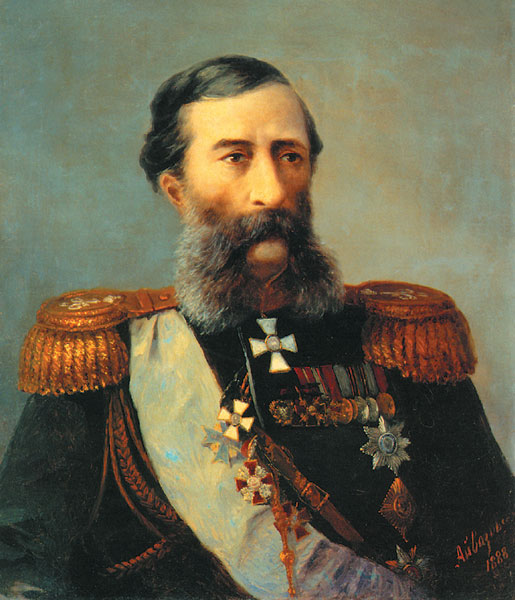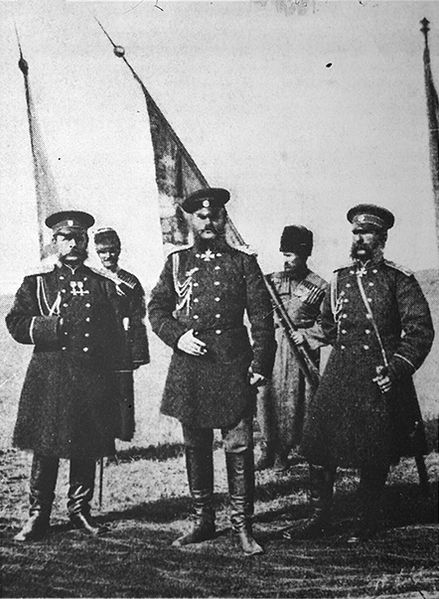<Back to Index>
- Minister of the Interior Mikhail Tarielovich Loris-Melikov, 1826
PAGE SPONSOR


Count Mikhail Tarielovich Loris - Melikov (Russian: граф Михаил Тариелович Лорис-Меликов, Armenian: Միքայել Լորիս-Մելիքով; Georgian: მიხეილ ტარიელის ძე ლორის-მელიქიშვილი; January 1 [O.S. December 20, 1825] 1826 – December 22 [O.S. December 10] 1888) was a Russian - Armenian statesman, General of the Cavalry, and Adjutant General of H. I. M. Retinue.
The Loris - Melikovs are the representatives of the old princely - count
family. In the XIV-th century the ancestors of this family owned the town
Lori and the province of the same name and belonged to the top
aristocratic society of Georgia. In Russian nobility the princely family
of the Loris - Melikovs (is translated from Georgian as “The Princes of
Lori”) was approved in 1832.
The earliest known ancestors of Count Mikhail Loris - Melikov hail from the Armenian monarchic dynasty of Bagratids,
whose blood line is linked to Zakharian prince, hereditary commanders
of Georgian armies in the 12th and 13th centuries.
He was born in Tiflis in 1825. Died in Nice in 1888. Loris - Melikov was the son of prince Zohrab Melikov and his wife princess Ekaterina Akhverdova.
Count Mikhail Tariel Loris - Melikov was an outstanding statesman of the Russian Empire, General - Adjutant, Member of the State Council. Count (1878), General of Cavalry (1875), an honorable member of the Academy of Science of St. Petersburg (1880). The leader of military actions in the Caucasus 1877 - 78. In 1880 the Head of the Supreme Administrative Commission. In 1861 the Head of South Dagestan and Mayor of Derbent, 1863 the Head of the Tersk region. In 1879 was sent to Kharkov where he was appointed as Governor General of Astrakhan, Saratov, Samara and Kharkov and was granted unlimited powers. Due to his unique success which crowned his activities in Kharkov, after the explosion in the Winter Palace in Feb. 12, 1880 was appointed as the head of the Administrative Commission and in fact became a dictator. On the 6th of August 1880 was appointed as the Minister of Internal Affairs and the Chief of the Gendarmes, in fact, the second after the Emperor in the Hierarchy of the State.
He was born in Tiflis, Georgia, in 1825 or 1826, and educated in St Petersburg, first at the Lazarev Institute of Oriental Languages, and afterwards at the Guards' Cadet Institute. He joined a hussar regiment, and four years later (1847) he was sent to the Caucasus, where he remained for more than twenty years, and created for himself during troubled times the reputation of a distinguished cavalry officer and an able administrator. In the latter capacity, though a keen soldier, he aimed always at preparing the warlike and turbulent population committed to his charge for the transition from military to normal civil administration, and in this work his favorite instrument was the schoolmaster.
In the Russo - Turkish War of 1877 - 78, he commanded a separate corps d'armée
on the Turkish frontier in Asia Minor. After taking the fortress of
Ardahan, he was repulsed by Ahmed Muhtar Pasha at Zevin, but
subsequently defeated his opponent at Ajaria, took Kars by storm, and laid siege to Erzerum. For these services he received the title of Count. He was awarded the Order of Saint George of the second degree on October 27, 1877 for his service in Ajaria.
In the following year, Loris - Melikov became the temporary governor general of the region of the Lower Volga to combat an outbreak of the plague. The measures he adopted proved so effectual that he was transferred to the provinces of Central Russia to combat the Nihilists and Anarchists, who had adopted a policy of terrorism, and had succeeded in assassinating the governor of Kharkov.
His success in this struggle led to his appointment as chief of the Supreme Administrative Commission which had been created in St Petersburg after the February 1880 assassination attempt on the Tsar to deal with the terrorist agitation in general. Here, as in the Caucasus, he showed a decided preference for the employment of ordinary legal methods rather than exceptional extralegal measures, even after an attempt on his own life soon afterwards. He believed that the best policy was to strike at the root of the evil by removing the causes of popular discontent and recommended to the emperor Alexander II a large scheme of administrative and economic reforms. Alexander, who was beginning to lose faith in the efficacy of the simple method of police repression hitherto employed, lent a willing ear to the suggestion. When the Supreme Commission was dissolved in August 1880, he appointed Count Loris - Melikov Minister of the Interior with exceptional powers.
The proposed scheme of reforms was at once taken in hand but was never carried out. On the very day (13 March 1881) that the emperor signed a ukase creating several commissions, composed of officials and eminent private individuals, to prepare reforms in various branches of the administration, he was assassinated by Nihilist conspirators; and his successor, Alexander III, at once adopted a strongly anti - reformist policy. When the new Tsar started to undo some of the reforms that his father, Alexander II had promulgated, Count Loris - Melikov resigned several months later and lived in retirement until his death at Nice on 22 December 1888.